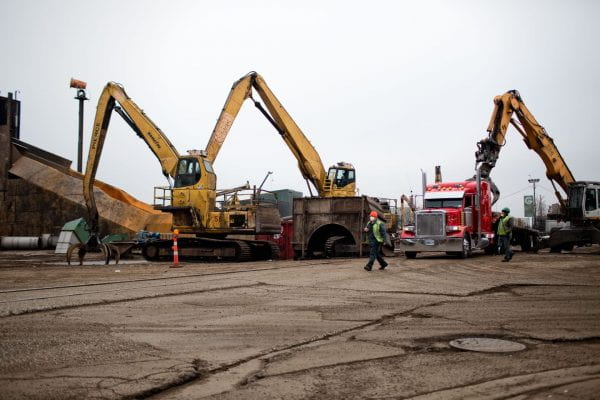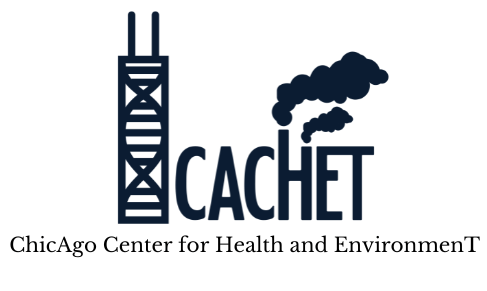
Photo: Nima Taradji for NBC Universal
January 6, 2022
To:
Honorable Lori Lightfoot, Chicago Mayor
Dr. Allison Arwady, Commissioner, Chicago Department of Public Health (CDPH)
Candace Moore, Chief Equity Officer, City of Chicago
Subject: RMG/Southside Recycling Permit Application and the Imperative to Deny the Permit
We, undersigned organizations, and individuals, write to you as your public health colleagues to communicate to you and the Chicago Department of Public Health (CDPH) our insistence that the permit application for the RMG/Southside Recycling, which acquired the assets of General Iron in Lincoln Park in the fall of 2019, be denied. The well documented excess burden of pollution already experienced by residents living in Southeast Chicago is strong enough evidence against a permit for the RMG/Southside Recycling’s facility in the Southeast Side. The decision to issue the permit would be in direct opposition to the shared vision to close the racial life expectancy gap in Chicago that we as public health professionals have committed to in Healthy Chicago 2025 which envisions a city where all people and all communities are empowered, free from oppression, and strengthened by equitable access to resources, environments and opportunities that promote optimal health and well-being.
We in public health stood with CDPH in June of this year when you declared racism a public health crisis. Being attentive to racial justice includes engaging in critical analysis of the role of how socio-economic, political structural decisions such as permitting of industry in low-income Black, Latinx and low-income communities maintain systems of oppression that advantage wealthy, white communities and disadvantage lower-income, Black and brown communities. Fighting for racial justice also means committing to building voice and power in the public health system of those who may be most burdened by city decisions in every step. By contrast, the city is currently proposing to reduce environmental burden in one area of the city while increasing burden in a community already overburdened by industrial emissions and associated health risks. This is unjust and unacceptable.
We stand firmly in our conviction that, based on healthy equity principles, the permit should be denied. We simultaneously feel compelled to also comment on both methodological and scientific deficiencies in the current Health Impact Assessment (HIA) that CDPH is conducting to inform the January 2022 permitting decision. Procedurally, the HIA is in direct conflict with racial justice and health equity principles and commitment that form the basis of Healthy Chicago 2025, which seeks to prioritize populations experiencing inequities, specifically Black, brown, and low-income Chicagoans, which are the very same people communities disproportionately burdened by pollution. We know that CDPH is well aware of best practice in community engagement in HIAs. Stakeholders need to be included in each step of the HIA process: in the selection of the data and methods used, drafting of recommendations, reporting, and monitoring and evaluation. Indeed, on November 2, CDPH stated the need for stakeholder engagement in the HIA process, but in direct contrast, announced that three out of the six steps in the HIA process had already been completed without inclusive and sustained community involvement. Further, the City’s proposed decision-making timeline in the holiday season prevents any meaningful engagement of community before the permitting decision is made in January 2022. The City’s recently announced plan to seek additional community input in an upcoming December meeting creates additional concerns that the rapid engagement during the holiday season prevents meaningful engagement that can alter the permit decision to be made in January. Furthermore, rushing the HIA process forward while severely lacking in meaningful and authentic community engagement without oversight by a community accountability team, a science advisory board, or external expert panel violates the moral imperative of a public health agency and puts the health of an already overburdened community at greater risk. In summary, the current process is misaligned with racial justice principles and best practices surrounding robust, antiracist community engagement in high-stakes public health decisions and there is no way to remedy this with CDPH’s proposed timeline.
In addition to deficits in the HIA engagement processes, we have also noted several critical scientific and technical deficiencies and limitations in the HIA work performed to date, including deficiencies related to the air quality analysis, and socioeconomic and health data analysis presented on November 2 meeting. These include the use of current EPA national air quality standards (NAAQS) for PM2.5, which are considerably higher than those recently adopted by the WHO; growing scientific health effects literature documenting health risks at levels far lower than the EPA’s NAAQS standards for PM2.5; lack of air, soil and health data more proximal to the proposed site; effects of increased truck traffic; anticipated impacts of outdoor storage and noise; biases inherent in community data as opposed to local comparisons of health; differential access to care; and lack of covariate data. Despite these HIA shortcomings, the ample data already in existence indicates that there is a disproportionate environmental burden currently experienced by the residents on the Southeast Side. Daily average PM2.5 concentrations measured by IEPA’s Washington High School air monitoring station are the highest in the region. The annual and 24-hour average PM10 concentrations, and heavy metal concentrations in Total Suspended Particulates (TSP) measured at the Washington High School site for lead, nickel and manganese have increased since 2018. There is a high level of traffic and a multitude of polluting industries in the area, as well as disproportionate differential access to medical care and services in this very same area. Our data concerns about CDPH’s HIA are so extensive that they will be detailed by a team of UIC SPH scientists and colleagues in a separate letter forthcoming.
Based on the information above, it is clear the permit for the RMG/Southside Recycling should be denied. The structural, process-related, scientific, and technical deficiencies of the HIA performed by the CDPH do not adhere to the scientific or professional credibility standards by any entity, including CDPH itself, to be considered an adequate assessment that can inform decisions, In the name of health justice, we are committed to eliminate the racial and structural inequities and disparities and improve health equity, particularly, for our socioeconomically disadvantaged Black and brown communities such as the southeast side. We urge the City and CDPH to foster and advocate for public health protection for all residents of Chicago, particularly for residents who are already burdened with higher and disproportionate public health risk.
To follow up or for more information, contact Jeni Hebert-Beirne, Associate Dean for Community Engagement, Interim Director of the Collaboratory for Health Justice and the ChicAgo Center for Health and EnvironmenT – Community Engagement Core (CACHET CEC) at sphcollaboratory@uic.edu.
Lead Letter Organizers:
UIC School of Public Health Collaboratory for Health Justice
Wayne H. Giles, MD, MS, Dean of the UIC School of Public Health
Jeni Hebert-Beirne, PhD, MPH, Associate Dean for Community Engagement, Interim Director of the Collaboratory for Health Justice
Maggie Acosta, MA, Assistant Director of the Collaboratory for Health Justice
The ChicAgo Center for Health and EnvironmenT – Community Engagement Core (CACHET CEC)
Jeni Hebert-Beirne, PhD, MPH, Co-Director, CACHET Community Engagement Core
Victoria Persky, M.D. Professor Division of Epidemiology and Biostatistics, UIC SPH
Serap Erdal, Ph.D., Environmental and Occupational Health Sciences, UIC SPH
Gail S. Prins, PhD, Michael Reese Professor, UIC College of Medicine and School of Public Health, Co-Director, CACHET
Habibal Ahsan, MD, Louis Block Distinguished Professor, Director, Institute for Population and Precision Health, University of Chicago, Co-Director, CACHET
Briseis Aschebrook-Kilfoy, PhD, Co-Director, CACHET Community Engagement Core
Daisy Magaña, MPH
Nadia Pack, BS
Rachel Brink, MPH/MBA (c)
Sandra Avelar, MPH (c)
Southeast Environmental Task Force
Olga Bautista, Executive Director of SETF
Rev. Matthew Zemanick, SETF
Yesenia Chavez, United Neighbors of the 10th Ward (UN10)
Breanna Bertacchi, United Neighbors of the 10 Ward (UN10)
Carlos Enriquez, SETF, Chicago Environmental Justice Network
Luis Rivera, MD Assistant Professor of Clinical Family Medicine, UIC College of Medicine.
UIC School of Public Health Administration and Divisions
Wayne H. Giles, Dean of the UIC School of Public Health
Alyson Lofthouse, Senior Associate Director, Global Health Program
Benjamin Shaw, PhD, MPH, Community Health Sciences Division Director
Christina R. Welter, DrPH, MPH, Director of DrPH in Leadership, Associate Director of Policy, Practice, and Prevention Research Center
Linda Forst, MD, MPH, Professor, Environmental and Occupational Health Sciences, Occupational Medicine Specialist
Nadine Peacock, PhD, Associate Dean for Diversity and Inclusion
The aforementioned letter has been signed by 8 elected and city officials, 69 organizations, and 754 individuals as of 10 am on Monday, December 20. For a full list of signatures, please click here.
